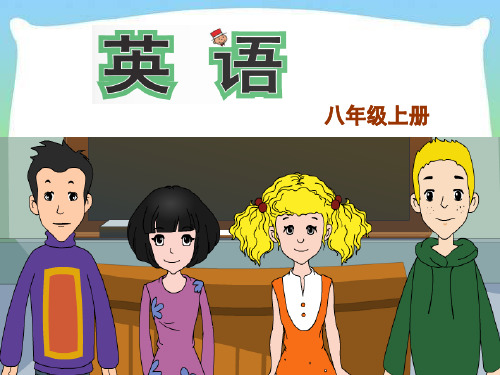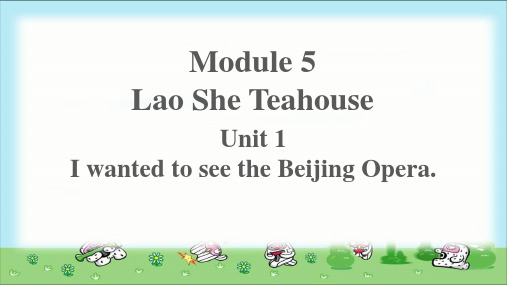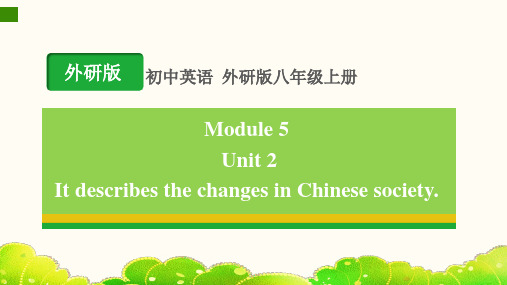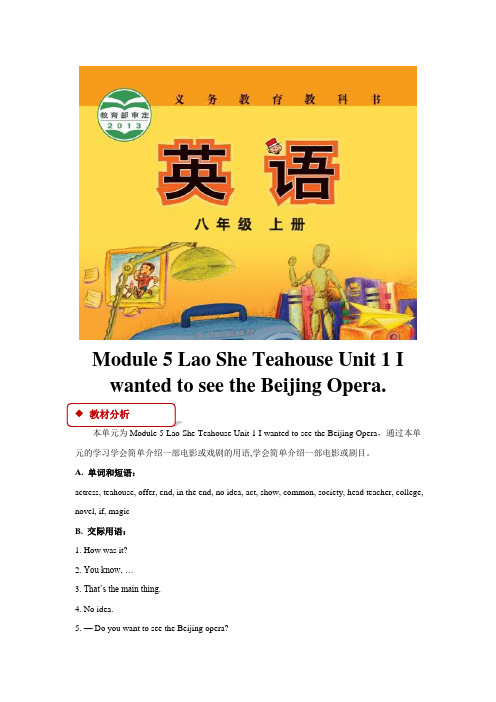八年级上Module 5 Unit1 和Unit2导学稿
新外研版八年级英语上册Module 5 Unit 1教学课件

A: Do you want to watch the news? B: Yes, I do. / No, I don’t. A: Does he want to watch the news?
ቤተ መጻሕፍቲ ባይዱ
B: Yes, he does./ No, he doesn’t.
A: Does she want to watch the news? B: Yes, she does./ No, she doesn’t.
My parents offered to buy a VCD player for us _____________________.
My hope is to _______________ live with kinds of ________________________________. animals and make friends with them
I hope to ______________________ design the most beautiful bags one day.
I wanted to sit ________________________ in the balloon and travel _______________. all over the world
而要询问对方有什么打算时用:what do you plan to do…? 这里的“ plan to do sth” 译为:打算/计划做某事。例如:
--What do you plan to watch tonight?
--I plan to watch Days of Our Past.
A: What do you plan to watch tonight? B: I plan to watch Mr. Bean. A: What does he plan to watch tonight?
Module 5 Unit 1 公开课教学PPT课件(外研版八年级上册)

语法要点
一般“女”的后缀是:woman,ess; “ 男”的后缀一般是:man等。
课堂操练
Complete the sentences. 1 I want to __g_o__to__th__e_p_a_r_k___ next week. 2 They offered to __m_a_k__e_a_c_a_k_e___. 3 I hope to __f_ly__to__t_h_e_m__o_o_n__ one day. 4 My parents agree to _s_e_e_a__fi_l_m__w_i_th__m__e__ on Saturday.
语法要点
4. No idea.不知道。 它是I have no idea.的缩写形式,与I don’t know.同义。 eg: —Do you know what time the last bus is?
你知道最后一班公交车是几点吗? —No idea./I don’t know.
不知道。/我不知道。
offer to (主动)提 Lingling offered to drive me home.
do sth. 出做某事 玲玲主动提出开车送我回家。
语法要点
eg: A lot of heroes ____C____ their lives ________ our
country during the earthquake in Sichuan.
八年级英语上册(外研版)教案 Module.5 Unit1授课典案

Unit 1I wanted to see the Beijing Opera.典案一教学设计Step 1Warming upShow some photos of the Beijing Opera, and have a short dialogue. (详见素材一导入二)Step 2Listening1.Present two photos on the screen and ask the students to learn the words actress and teahouse. Ask the students to look at the photos in Activity 1 and have a short dialogue.2.Play the tape and let the students underline the correct words or expressions in Activity 2.Then the teacher points out some sentences with infinitives as objects.(详见素材四突破一)Step 3Reading1.Before listening to the dialogue in Activity 3, ask the students to answer the two questions.2.Play the tape and let the students check the true sentences in Activity 3. Play the tape again and ask the students to repeat it. At last, choose some students to act the dialogue.3.Ask the students to read the words in the box and the short passage in Activity 4 and complete the short passage. Then, check the answers with the deskmates. Finally, read the short passage and pay attention to the using of the important words: end, main, offer.(详见素材四突破二)Step 4Pronunciation and speaking1.Ask the students to listen to the tape carefully and read the conversations in Activity 5.Pay attention to the words that need to stress.2.Work in pairs. Imagine the students will go to the park next weekend. Ask them to work in pairs and discuss their own ideas.(详见素材四突破三)Step 5Language points(详解见学案部分)1.offer v. 提议;提出2.end n. (时间的)最后一段,末尾v. 结束3.How long did you stay?你们待了多久?4.—Who is Lao She?老舍是谁?—No idea. 不知道。
Module5Unit1(第二课时)教学设计外研版八年级英语上册

课后反思
信息全 面,动词 不定式 运用正 确,写出 关于国 庆假期 的计划 以及所 到的城 市或者 国家的 文化。 布置分 层作业, 满足不 同层次 学生水 平。
外文学史上有代表性的作家和作品”和“中外建筑的文化价值”
语篇 子主题。
研读
What: 本单元对话以玲玲带贝蒂前往老舍茶馆观看京剧为
主题,讲述了贝蒂在茶馆内的所见所闻,并简单介绍了京剧、
作家老舍及其代表作《茶馆》;
Why: 对话以谈论中国国粹京剧为主线,激发学生对京剧、 话剧等中国传统文化的兴趣和热爱,增强其民族自豪感。
3.be famous for/as. be famous for=be wellknow for 意为 “因……而出名”,后接出名的原因。be famous to=be wellknow to 意为“为某人所熟知”,后接某人。be famous
as=be wellknow as 意为“作为……而出名”,后接表示身份、 职位、名称等的词。 1)老舍以他的话剧茶馆而出名。【课本原句】
下参与角色表演等活动;能在上述口语活动中使用正确的语音、
语调;(说)
3. 能在教师的帮助下或以小组讨论的方式起草和修改作文; 课标 (写)
分析 4. 敢于用英语进行表达,在小组活动中积极与他人合作,能在 英语交流中注意并理解他人的情感。
课标分解
1. 能连贯、流畅地朗读关于表达自己的意图和计划以及介绍老 舍茶馆的句子以及对话;
Requirements: 1. You should use the correct punctuation. 2. You should use some conjunctions (and, but...) to make the passage clear and coherent. 3. You should use no less than five sentences.
Module5Unit2课件八年级英语上册

=He returned my pen to me. 他把钢笔归还给了我。
作名词,意为“归还;回报;报答”, 常见短语:in return 作为报答,作为回报。 eg:I sent him a book;in return,I got a coat.
Do you know how to skim?
•Don’t read every word or sentence.
•Focus on topic sentences.
•Just read to get the main idea.
Match the headings with the paragraphs.
_h_e_a_d__te_a_c_h_er__o_f _a_p_r_im__a_ry__sc_h_o_o_l___
1924 __le_f_t_h_o_m__e_a_n_d__w_e_n_t_t_o__E_n_g_l_a_n_d______ 1957 __w_r_o_t_e_T_e_a_h_o_u__se______________
Read paragraph3—scanning
If we go to Lao She Teahouse, what can we do?
We can drink __te_a__.
We can eat__d__el_i_ci_o_u_s_B__e_ij_in__g_f_o_o_d___.
We can also enjoy_B_e_ij_i_n_g_O__p_e_r_a, _t_ra_d__it_io_n_a_l_m__u_s_i_c_ and _m_a_g_i_c_s_h_o_w__s_.
外研版八年级英语上册教案Module 5 Unit 1

Module 5 Lao She Teahouse Unit 1 Iwanted to see the Beijing Opera.本单元为Module 5 Lao She Teahouse Unit 1 I wanted to see the Beijing Opera ,通过本单元的学习学会简单介绍一部电影或戏剧的用语,学会简单介绍一部电影或剧目。
A. 单词和短语:actress, teahouse, offer, end, in the end, no idea, act, show, common, society, head teacher, college, novel, if, magicB. 交际用语:1. How was it?2. You know, …3. That’s the main thing.4. No idea.5. —Do you want to see the Beijing opera?—Yes, I’d love to.6. — Do you want to come to Lao She Teahouse with me?—Yes, please. I’d like to go with you.7. I wanted to see the Beijing Opera.8. Lingling offered to take me there.9. We only planned to watch for an hour.10. We decided to stay for three hours.11. I hope to understand more next time.12. — I want to see the Beijing Opera.—Why don’t we …?1. Function: Talking about intentions and plans.2. Structure: Infinitive structures (1): infinitives as objects; verbs followed by infinitives.3. Skills:1) Listening and understanding familiar topics (Beijing Opera) finding specific information.2) Describing intentions and plans in simple language.3) Reading and understanding the sequence of events.4) Writing a short passage about favourite play or film.4. Around the world: Theatres5. Task: Acting out a scene from a play.wInfinitive structures (1): infinitives as objects; verbs followed by infinitives.Tape recorder, OHP, videoStep 1 Lead inTeacher:Do you ever see Beijing opera?1. Enjoy a play: Lao She Teahouse2. Look at the pictures, and talk something about the pictures.Step 2 Presentation1.To preview the passage and search some information about Teahouse.2. Introduce the new words,learn and read: the Beijing Opera\actress\TeahouseSentence:What do you plan to do this Sunday?----I plan to …this Sunday.What do you plan to do this Sunday?---- I plan to …this SundayWhere do you want to go?-----I want to go….What do you decide to eat/drink?----I decide to eat/drink ….3. Knowledge:Who’s Teahouse wrote by?Lao SheJob: WriterBorn:1899Die:1966Birth Place: BeijingWorks: Camel Xiangzi\Teahouse\The yellow stormTeacher show some pictures of Lao She’s Teahouse and teach Ss how to enjoy it.4.Study the Words and expressions, let Ss read them aloud.Step 3: Practice1)Work in pairs. Look at the pictures and talk about them. Use the words in the box to help you.2)Listen and underline the correct words or expressions.1.Betty often sees/wants to see the traditional Beijing Opera.2.Betty knows/ doesn’t know Lao She Teahouse.3.Lingling says that the opera is easy/ difficult to understand.3)After listening:Listen and read. Now check (√) the true sentences.1.Tony went to Lao She Teahouse with Betty and Lingling.2. Betty understood the opera.3. Lingling and Betty stayed longer than they planned.4. Betty enjoyed the opera.5. Betty would like to see the Beijing Opera again.6. Betty knew about Lao She before she went to the house.4)Complete the passage with the correct form of the words in the box.Betty wanted to see the Beijing Opera, so Lingling (1) ______ to take Betty to Lao She Teahouse. The words of the opera were (2) _______ to understand, but the actors and (3) ________were excellent. They only planned to watch for an hour, but in the (4)____, they stayed for three hours. Betty thought it was interesting-that was the (5) _____ thing!Step 4 Conclusion1.Speaking:英语语句中的重读规则即对所强调的信息进行重读。
Module5Unit1课件八年级英语上册
二、情景交际。根据对话内容,从方框中选出恰当的句子补全对话,并将
选定答案的字母标号填在相应的横线上。
A:Hi,Daming.1. C . B:Hi,Tony. I’m reading a play named Teahouse.
Have you read it? A:No,I haven’t. What’s it about? B:2. E . A:Is it interesting? B:Yes,it is.3. A . A:By the way,who’s the writer?
at the end of+时间名词,“在……(时间)结束时,在……末/ 底” at the end of+地点名词,“在……(地点)的终点,末端,尽头” by the end of…,“到……结束时为止”(常与完成时连用)
用与end相关的短语完成句子,词数不限。 ①He passed the English exam in the end . ② At the end of the day, he’ll still have to make his own decision. ③ At the end of the road, you will find a hotel.
自主学习
一、必背单词(请在课文中找出下列单词)
名词
1.女演员 actress 2.(尤指亚洲的)茶馆
teahouse
动词 3.提议;提出 offer
兼词 4.(时间的)最后一段;末尾n. 结束v.__e_n_d___
二、常用短语(请在课文中画出下列短语)
1.看京剧
see the Opera
Beijing
三、经典句型(请在课文中画出下列句型)
秋八年级英语外研版上册课件:Module 5 Unit 2(共26张PPT)
常考短语 1. __o_n_e__o_f___ 其中之一 2. __s_e_n_d__._._.__t_o__._._.____送……到…… 3. __r_e_t_u_r_n__t_o___ 回到…… 4. ___w_a_s__n_a_m_e_d__ 被命名为…… 5. _g_i_v_e__a__w_a_r_m__w_e_l_c_o_m_e__t_o__._._.__ 给予……热烈的欢迎
( A )2. Lao She is described __________ “the
People’s Artist”.
A.as B. in
C. with
D. for
【3】 one of 的用法
【举例】He described himself as a doctor. 他自称是 医生。
【应用】
( C )1. —Amy, can you __________ what your
sister looks like?
—She’s thin and beautiful.
A. look B. watch C. describe D. catch
—Yeah! He’s tall and he wears glasses. 3. —Who’s Ms Brown?
—She’s a teacher at a ___c_o_l_l_e_g_e_ in London.
•9、要学生做的事,教职员躬亲共做;要学生学的知识,教职员躬亲共学;要学生守的规则,教职员躬亲共守。2021/9/152021/9/15Wednesday, September 15, 2021 •10、阅读一切好书如同和过去最杰出的人谈话。2021/9/152021/9/152021/9/159/15/2021 2:59:32 AM •11、只有让学生不把全部时间都用在学习上,而留下许多自由支配的时间,他才能顺利地学习……(这)是教育过程的逻辑。2021/9/152021/9/152021/9/15Sep-2115-Sep-21 •12、要记住,你不仅是教课的教师,也是学生的教育者,生活的导师和道德的引路人。2021/9/152021/9/152021/9/15Wednesday, September 15, 2021
外研版八年级上Module5全模块教案.docx
Module 5 Western music I. Teaching objectives 教学目标技能目标听Listen for matching people with the music they like 说Talk about opinions about music读Read a passage about music for information写Write a biography of a composer语■ ■> a ri目标功能句式Talk about musicYou like western classical music, don5t you? Yes, I do. Who's yourfavourite classical composer? Beethoven. She doesn^t like pop music,does she?You've heard of him, haven't you?He was German, wasrTt he?You listen to pop music, don't you?It's certainly very traditional, isn't it?词汇1.重点词汇:pop, techno, beautiful, fun, lively, sad5 serious, show, traditional sure,Austrian, composer, fan, on earth, noisy, centre, drum, guitar, violin,elder, die, rest, maybe, phone, instrument, of course, loud, record, own,century2.认读词汇blues, classical, jazz, rock, dramatic, German, rap, organ, trumpet, waltz,younger, add让ion, actually, type, gospel, string, part-time, milkman,recording, artist, figure3.短语in addition to语法Tag questionsII ・ Teaching materials analyzing 教材分析本模块以Western music为话题,设计了三个部分的内容。
Module5unit1教案英语八年级上册
能够听懂有关京剧的对话,了解老舍茶馆并感知动词不定式作宾语的表达方式,能简单描述自己的意图和计划3. 情感与文化目标:热爱京剧、话剧等中国传统文化,增强民族自豪感。
Step 1: lead inLook at a picture of Laoshe Teahouse. Can you saysomething about it? What can people do there?Learn the new words: teahouse, traditional, theatre actress,offer, end,…Step 2 Prelistening1 . Free talkT: As we know, Opera is very popular in western countries ,such as Romeo and Julia from France , The Ladies of theCamellias from Italy and so on . But do you know whatis called Oriental Opera ?S : The Beijing opera .T : Yes , it is also our China’s traditional opera . I like itvery much .Ask students to enjoy some pictures and watch a video(点击第一张幻灯片最后一幅图中超链接播放视频).Then lead the title .2 . Learn the new words by guessing words .3 . Practice the new words and check Activity4 .4 . Work in pairs . Talk about the pictures with the words inthe box . ( Activity 1 )For example :a : Do you like watching the traditional Beijing Opera ?b : … .a : Where can we watch it ?b : We can watch it… .a : Do you know what other things we can do there ? Step 3 Whilelistening1 . Betty would like to see the traditional Beijing Opera . And Lingling wants to take her to Lao She Teahouse. Now listen and underline the correct words or expressions ( Activity2 ) . Then check their answers .2 . listen and read ( Activity3 )Last night Lingling took Betty to Lao She Teahouse. Betty felt very happy . Now she is telling Tony something about Lao She Teahouse . Listen to the tape and answer the questions . Qs :a :Why did Lingling take Betty to the Teahouse ?b : What did Betty and Lingling do at the teahouse ?c : Does Betty know about Lao She ?3 . Skim the dialogue and find the sentences with to do in the dialogue. Then tell students what they should pay attention to.4. Read it again and check the true sentences .5. Ask students to work in groups and roleplay theconversation.Step 4 Postlistening1. Pronunciation and speaking .1). Ask students to read the sentences and predict whichwords in the answers the speaker is likely to stress . 2). Play the recording for students and ask them to checktheir answers .3). Ask students to report their answers and read theconversations loudly in pairs .2. Give students some examples and ask them to talk aboutsomething they’d like to do or see . Then work in pairs .For example :—— Where do you plan to do this summer holiday ?—— I plan to go to … .—— What would you like to do there ?—— I would like to … there .—— … .3. Summarize what we have learned in this class .1). Encourage students to summarize the use of the verbInfinitive and ask them to use the words to describe some events in their life .2) . Lead them to learn more knowledge points.4. Ask students to do some exercises and then check theanswers . Give some help if necessary .。
- 1、下载文档前请自行甄别文档内容的完整性,平台不提供额外的编辑、内容补充、找答案等附加服务。
- 2、"仅部分预览"的文档,不可在线预览部分如存在完整性等问题,可反馈申请退款(可完整预览的文档不适用该条件!)。
- 3、如文档侵犯您的权益,请联系客服反馈,我们会尽快为您处理(人工客服工作时间:9:00-18:30)。
Module 5: Healthy foodUnit 1: Have we got any oranges?课型:听说课【学习目标】:1.知识目标:words and phrases: apple,beef,carrot,chicken,juice,melon,milk,onion,orange,pork,potato, tomato., healthy.drink. fruit, vegetableKey structures: Have you got any… .We have got some…We haven’t got any…2.能力目标:1.能记住并理解有关食物的名词,分清可数和不可数名词;能听懂有关饮食的简短对话。
2.能运用have/have got…句式进行对话。
3.情感目标:培养学生科学合理的饮食习惯。
增强学生健康意识,远离不健康的食品。
【教学重难点】:1.重点句型:Have we got any juice? Yes, we’ve got some juice. We haven’t got any apples.2. 难点:可数名词和不可数名词的区别。
some 和any 的用法区别。
【教学过程】:[课前朗读]:朗读单词表第一单元的单词,根据音标读出单词并了解汉语意思,养成学生自主学习词汇的习惯,促使学生迅速进入学习状态。
[检查词汇预习]:a. 取学生结对、小组互查等形式来检查学生对词汇的预习情况。
b. Match the words with pictures.完成Activity 1。
c.逻辑归类:试着将他们分类.完成Activity 2,3bread, banana, coffee, orange, onion, rice, potato, milk, apple, hamburger, melon, noodle, juice, tea, cake, water, carrot, tomato(1) vegetables: _____________________________________________(2) fruit: ___________________________________________(3) drink:_______________________________________________(4) meat: ________________________________________________d.大声朗读以上单词。
【新课学习】.一、小听力:1听录音,把你听到的食物和饮料标出来。
2.Betty and her mum are talking about what food they’ve got. Listen and check what they’ve got.完成Activity 4。
二、大听力多层听1. Listen to activity5 and underline the correct answers.1) They’ve got some juice/milk.2) They haven’t got any carrots/meat.3) They’ve got some melons/apples.2.Listen again, ,answer the following questions.组内对答案,操练have got 的一般疑问句及回答。
(1)Have they got any juice?(2)Have they got any meat?(3)Have they got any carrots?(4)Have they got any melons?三、重难点突破(合作探究):1.Have we got any juice? Have we got any carrots?这两个句子都是have got的一般疑问句。
句中juice 用原形,因为它是_______(可数/不可数)名词,carrots 是carrot 的________.请你把下面实物名词分类:apple, orange, fish, meat, rice, milk, potato, egg, beef, carrot, chicken, banana, juice, pork, water, melon, tomato可数名词:__________________________________________________________复数形式:_______________________________________________________不可数名词:_______________________________________________________译:你有苹果吗?________________________________________________ 他们有牛肉吗?________________________________________________2. some 和any 的用法。
由对话中的句子可以看出,some 用在________(肯定句/否定句/疑问句)中,any 用在_____________(肯定句/否定句/疑问句)中。
some ,any 后要跟可数名词复数或不可数名词。
用some 或any 填空。
Have you got ______friends? Yes, I’ve got _______new friends.There’s ________water in the bottle but there isn’t ______ milk.I’d like to have ______orange juice.四、诵读积累(一)跟录音机朗读对话,模仿语音语调。
(二)读熟对话(三)读烂下列重点句子1. Have we got any juice? Yes, we’ve got some juice.2. Have we got any meat? No, we haven’t.3. Have we got any carrots? Yes, we’ve got some carrots.4. We haven’t got any apples.(四)默写,组长交叉监督,各组统计好分数,评出优胜小组。
五、习题巩固I: 单项选择1. Excuse me , _____you _______a pen?A. Are, haveB. Have ; gotC. Can, haveD. Do , get2. —_______your brother got an American friend?—Yes, his friend’s name is Jack.A. IsB. CanC. HaveD. Has3. —Are there _______televisions in your classroom ?—No, there aren’t any.A. anyB. someC. aD. the4.—Have they got any apples?---_____________. Can you give them some ?A. Yes, they haveB. No, they haven’tC. Yes, we haveD. No, I haven’t5. Is there ______ beef in the dining hall?A. someB.anyC. aD. anII.完成下列句子。
(1.) 他们有些肉。
They have got ______ ______ .(2.) 我们没有橘子。
We haven’t _______ _______ _______.(3.) 我们有水果吗?______ we ______ any fruits?(4.) Tony likes______ ______ ______ (西红柿和鱼) very much.(5.) 你妈妈有车吗?_____your mother _____ a car?六.Homework1. 在作业本上用本课的重难点进行造句。
2. 继续疯狂朗读对话,争取背熟。
Unit 2 A lesson in good health导学稿学习目标1.通过阅读材料,获取关于health,healthy food的有关信息。
2.了解中西方饮食文化的差异。
3.学会使用and,but写关于healthy food以及扩展开的句子,小段落。
4.学会就饮食给他人提建议。
学习过程课前延伸1. 根据提示列出你在unit1中学过的词汇vegetables:_________________________________________________fruit:_____________________________________________________meat:_________________________________________________________你还知道哪些关于食物的单词:____________________________________上面词汇你还未记住的有_________________________________________请独立完成P28 (2),后小组讨论结果。
2. What vegetable do you like best? 与What is your favorite vegetable?意思一致。
猜猜favorite的意思是:__________.3. 将上面列出的食物按照提示分类:(P28.1)Healthy food and drink:____________________________________________Favorite food and drink:___________________________________________课内探究预习交流1.朗读P29 ―Healthy food and drink‖,找出:1. 并列连词___________2. 转折连词___________你还不明白的单词有_________________________________________你还不明白的句子有__________________________________________________________________________________ 独立完成P28 (3), 小组讨论结果,并在文中找出依据.学习应用1. 根据实际完成下列对话--What’s your favorite food and drink?--My favorite food is ___________, and my favorite drink ___________.--Are they healthy?--______ is healthy but ________isn’t healthy.2. 熟读对话后,小组内进行采访演练,之后各小组派出两名同学采访其他小组成员,并作好记录。
